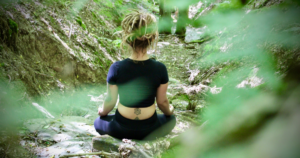Self-acceptance - the path to holistic joy of life
Reading time: < 8 minute
In a world full of expectations, pressure to perform and demands for perfection, many people find it difficult to accept themselves as they are. We are constantly trying to align ourselves with ideals and cover up our supposed shortcomings.
The Buddha taught that human suffering arises primarily from the inability to accept the constant changes and imperfections of existence. Instead, we frantically try to cling to consistency, perfection and control – which inevitably leads to disappointment, anxiety, self-doubt and frustration.
We only find true freedom and healing when we learn to accept ourselves and the world as they are. This means recognising the transience of all phenomena, the inadequacy of the ego and the interdependence of all being.
If we learn to accept all our facets – strengths and weaknesses alike – unconditionally, we can find deep self-love and wholeness.
Rather, it is about a deep insight into the nature of existence and an attitude of openness, compassion and wisdom. When we stop clinging to fantasies of perfection and control, we can focus our energy on living with mindfulness and presence in the here and now.
This does not mean that we become passive or stop working on our personal growth. Self-acceptance does not exclude the desire for change and improvement. But it does free us from the agony of constant struggle and self-condemnation.
Emotional acceptance – allowing all feelings
The first step is often to recognise what is going on inside you in the first place – to feel and allow your own fears, longings, desires and needs. This can be unfamiliar and even frightening at first, as we all too often try to suppress or repress unpleasant feelings such as fear, anger or sadness. But this is precisely what prevents us from being present in the here and now and consciously shaping our lives.
Instead, we need to look at all facets of our emotional experience with compassion. Every emotion, however painful it may be, has its justification and can give us valuable impulses for our personal growth. When we learn to allow joy as well as pain without judging them, we develop a deep inner resilience and emotional stability.
Acceptance of the body – appreciation for the human miracle
Another key aspect of self-acceptance is our relationship with our body. Many of us struggle with supposed flaws or inadequacies instead of recognising and appreciating our body as an expression of our unique personality.
Yet our body is a highly complex, fascinating marvel that supports and cares for us throughout our lives. When we begin to treat it with gratitude, mindfulness and compassion, the path to deep physical self-acceptance opens up. We get to know our senses, needs and limits better and can therefore treat ourselves with greater respect.
Accepting our own dark sides
A holistic self-image also includes the willingness to accept our ‘shadow sides’ – i.e. those feelings, characteristics or behaviours that we would rather hide. We often perceive these parts as weak, undesirable or even threatening.
But it is precisely these sides that make us the unique people we are. If we approach them with compassion and openness, we can learn to deal with them constructively and become integrated, self-accepting personalities.
Only then can we develop our full strength and recognise the actual positive qualities of these supposedly negative aspects.
Acceptance of others and challenges
Finally, self-acceptance is also closely linked to the ability to accept other people and challenges or situations as they are. We often project our own shortcomings onto our fellow human beings or desperately try to gain control over external circumstances.
However, we only find true freedom and joy in life when we let go and learn to accept everything as it is. This does not mean remaining inactive or approving of things that we can change. Rather, it is about reacting with compassion and inner calm to what we cannot control.
Accepting your own limits and needs
An important part of self-acceptance is recognising our own limits and needs and treating them with respect. We often try to go beyond our limits in order to fulfil expectations or appear perfect. In the long term, however, this can lead to excessive demands, burnout and inner frustration.
It is important to be honest with yourself and recognise your own limits, states of exhaustion and need for rest and relaxation. Only if we learn to say ‘no’ and take the necessary time out can we stay healthy and balanced in the long term.
Accepting change and uncertainty
In our fast-moving times, change and uncertainty are constant companions. Many people perceive these as threatening and try desperately to hold on to security and control. But this often leads to anxiety, stress and tension.
Deep self-acceptance involves the ability to face change and uncertainty with serenity and trust. When we learn to let go and embrace the flow of life, new, unimagined possibilities open up. We can utilise crises as opportunities for growth and shape our lives with openness and creativity.
Acceptance of failure and mistakes
Another important aspect is the ability to deal with mistakes, failures and setbacks. In our meritocracy, there is often an expectation that we must always be perfect and successful. However, failure is a natural part of human learning and growth.
If we learn to accept mistakes and shortcomings with compassion instead of condemning ourselves for them, a path to self-acceptance opens up. We can gain valuable insights from failures and develop further without doubting our self-love.
Acceptance of one’s own mortality
Last but not least, coming to terms with one’s own mortality is also part of a holistic understanding of self-acceptance. In a society that glorifies youth, health and immortality, many find it difficult to accept the fact that we as human beings are also finite.
But it is precisely the encounter with our transience that can teach us to appreciate life in a deeper way. When we come to terms with the thought of death, we can recognise what really matters and shape our existence in a more conscious and fulfilling way.
Here are some helpful tips on how you can integrate self-acceptance into your everyday life and develop it as a path to more self-love and joy in life:
1. practise mindfulness
Mindfulness is the key to self-acceptance. Regularly take time to be mindful of yourself and notice your thoughts, feelings and physical sensations without judging them. Be curious and meet everything with compassion. Write in a diary.
2. Be your own best friend
Ask yourself the question: ‘How would I treat a good friend who has the same “weaknesses” as me?’ Try to treat yourself with the same appreciation, patience and support.
3. accept your limits
Recognise your personal boundaries and needs. Learn to say ‘no’ when you reach your limits. Allow yourself regular breaks and time-outs.
4. work with your ‘shadow’
Meet your supposedly ‘dark’ sides with openness. Take a close look at what lies behind them and lovingly integrate them into your self-image.
5. be grateful
Cultivate a sense of gratitude for all the positive things in your life. Focus on your strengths, talents and achievements instead of focussing on shortcomings.
6. practise (self-)compassion
Talk to yourself as you would to a loved one. Meet your mistakes and shortcomings with compassion instead of judging yourself.
7. let go and trust
Practise letting go and facing change, uncertainty and imperfection with trust. Embrace the flow of life instead of clinging to control.
8. Integrate a spiritual practice
Spiritual practices such as meditation, yoga or contemplation can be very helpful in developing a deeper understanding of your own nature and oneness with all being.
The path to self-acceptance is not always easy, but it is worth it because it leads us to a more fulfilled, more authentic life. With perseverance, patience and loving self-guidance, everyone can follow the path to deep self-acceptance and holistic fulfilment.
Let your heart guide you and dare to become loving towards yourself.
Namasté, Shania

Hey, i am Shania
It is a matter of the heart for me to guide people to their shadow in a sensitive way, to let them recognise through self-awareness what is hidden behind their anchored pain and suffering and how they can use these insights for themselves in a healing and transformative way.

Self-acceptance – the path to holistic joy of life
This blog article is about the aspects and facets of self-acceptance, as well as practical tips for more acceptance in life.

Your body – The temple of your soul
This blog post deals with the topic of seeing one’s own body as an integral part of the self and the temple of the soul. It is about how we can find unconditional self-acceptance and self-love, regardless of society’s ideals of beauty.

Breathwork -the healing power of the breath
The following blog article is about Breathwork and the positive effects of breathing on the nervous system, emotional blockages, body, mind and soul.
